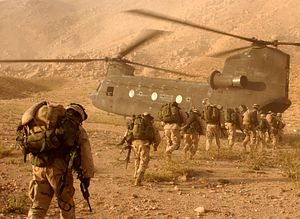In a speech on Tuesday, U.S. President Barack Obama clarified the trajectory of the United States’ war in Afghanistan. While it has been known for some time that U.S. and NATO troops would formally withdraw from Afghanistan at the end of 2014, little was known about the precise number of troops that the U.S. would be willing to leave behind as part of the U.S.-Afghanistan Bilateral Security Agreement (an agreement that has yet to be signed). Obama noted that according to the latest timetable for the Afghanistan withdrawal, the United States would reduce its troop count from 32,000 to just shy of 10,000. The U.S. troop presence in Afghanistan peaked at 101,000 in 2011. The withdrawal will continue well into 2015 and 2016, with the troop presence halving in both of those years.
The withdrawal from Afghanistan will allow for U.S. military resources to be used to fight terrorism across the Middle East and North Africa, Obama said. Obama will deliver the commencement address at the U.S. Military Academy at West Point tomorrow and is expected to broadly outline his foreign policy priorities in the coming year, including the implications of the Afghanistan withdrawal for U.S. policy in the Middle East and North Africa. He is also expected to address some of the criticisms of his administration’s handling of the crises in Syria and Ukraine. In his speech on Tuesday, Obama did not mention the implications of the withdrawal from Afghanistan for the Asia-Pacific region. Part of the “Pivot” or “Rebalance” to Asia — broadly the policy the United States aims to pursue in the Asia-Pacific — is to reallocate U.S. military assets from the Middle East and Afghanistan to East Asia.
Obama addressed the public perceptions around the war in Afghanistan which is the longest war the United States has fought in its history. “Americans have learned that it’s harder to end wars than it is to begin them,” he said. “Yet this is how wars end in the 21st century.” “We have to recognize Afghanistan will not be a perfect place, and it is not America’s responsibility to make it one,” he added. Although Americans have grown tired of the Afghan war, recent polling by ABC News and the Washington Post showed that just over half of all Americans (55 percent) favor a post-2014 troop presence in Afghanistan for training and anti-insurgency operations — the precise objective of the post-BSA troops. While a majority favored maintaining a troop presence, 66 percent of all Americans said that the war has not been worth fighting, with 50 percent agreeing strongly that the war in Afghanistan was ill-conceived.
Obama’s declarations on Afghanistan this Tuesday were largely unilateral. As the incumbent Afghan president, Hamid Karzai, prepares to leave office following the run-off elections in June, the Obama administration is looking forward to dealing with his successor. In recent months, Karzai and Obama have seldom talked. When Obama traveled to Afghanistan on May 25 to speak with U.S. troops, he did not meet with Karzai. In his final year in office, Karzai has largely not cooperated with the United States, stubbornly refusing to sign the BSA and pursuing back-channel negotiations with the Taliban.
Here are Obama’s complete remarks on Afghanistan.

































